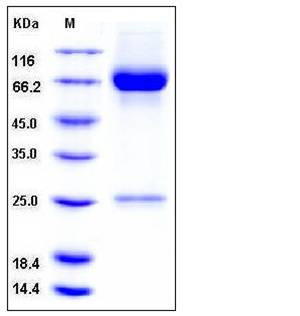Human MMP8 / CLG1 Protein (His Tag)
CLG1,HNC,MMP-8,PMNL-CL
- 100ug (NPP4088) Please inquiry
| Catalog Number | P10254-H08H |
|---|---|
| Organism Species | Human |
| Host | Human Cells |
| Synonyms | CLG1,HNC,MMP-8,PMNL-CL |
| Molecular Weight | The recombinant human MMP8 consists of 458 amino acids after removal of the signal peptide and has a predicted molecular mass of 52.6 kDa. In SDS-PAGE under reducing conditions, the apparent molecular mass of rhMMP8 is approximately 65-75 kDa due to glycosylation. |
| predicted N | Phe 21 |
| SDS-PAGE |  |
| Purity | > 90 % as determined by SDS-PAGE |
| Protein Construction | A DNA sequence encoding the human MMP8 (NP_002415.1) (Met 1-Gly 467) was expressed, fused with a polyhistidine tag at the C-terminus. |
| Bio-activity | Measured by its ability to cleave the fluorogenic peptide substrate, Mca-PLGL-Dpa-AR-NH2 (AnaSpec, Catalog#27076) . The specific activity is > 250 pmoles/min/μg . (Activation description: The proenzyme needs to be activated by APMA for an activated form) |
| Research Area | Cardiovascular |Cardiovascular disease Therapeutic Targets |Atherosclerosis Therapeutic Targets |
| Formulation | Lyophilized from sterile 50mM Tris, 10mM CaCl2, 150mM NaCl, pH 7.5 1. Normally 5 % - 8 % trehalose, mannitol and 0.01% Tween80 are added as protectants before lyophilization. Specific concentrations are included in the hardcopy of COA. |
| Background | Matrix metalloproteinases (MMPs) are a family of zinc-dependent endopeptidases that degrade components of the extracellular matrix (ECM) and play essential roles in various physiological processes such as morphogenesis, differentiation, angiogenesis and tissue remodeling, as well as pathological processes including inflammation, arthritis, cardiovascular diseases, pulmonary diseases and tumor invasion. Neutrophil collagenase, also known as Matrix metalloproteinase-8, MMP-8, and CLG1, is a member of the peptidase M10A family. MMP-8 may affect the metastatic behaviour of breast cancer cells through protection against lymph node metastasis, underlining the importance of anti-target identification in drug development. MMP-8 in the tumour may have a protective effect against lymph node metastasis. MMP-8 may affect the metastatic behaviour of breast cancer cells through protection against lymph node metastasis, underlining the importance of anti-target identification in drug development. MMP-8 participates in wound repair by contributing to the resolution of inflammation and open the possibility to develop new strategies for treating wound healing defects. |
| Reference |
